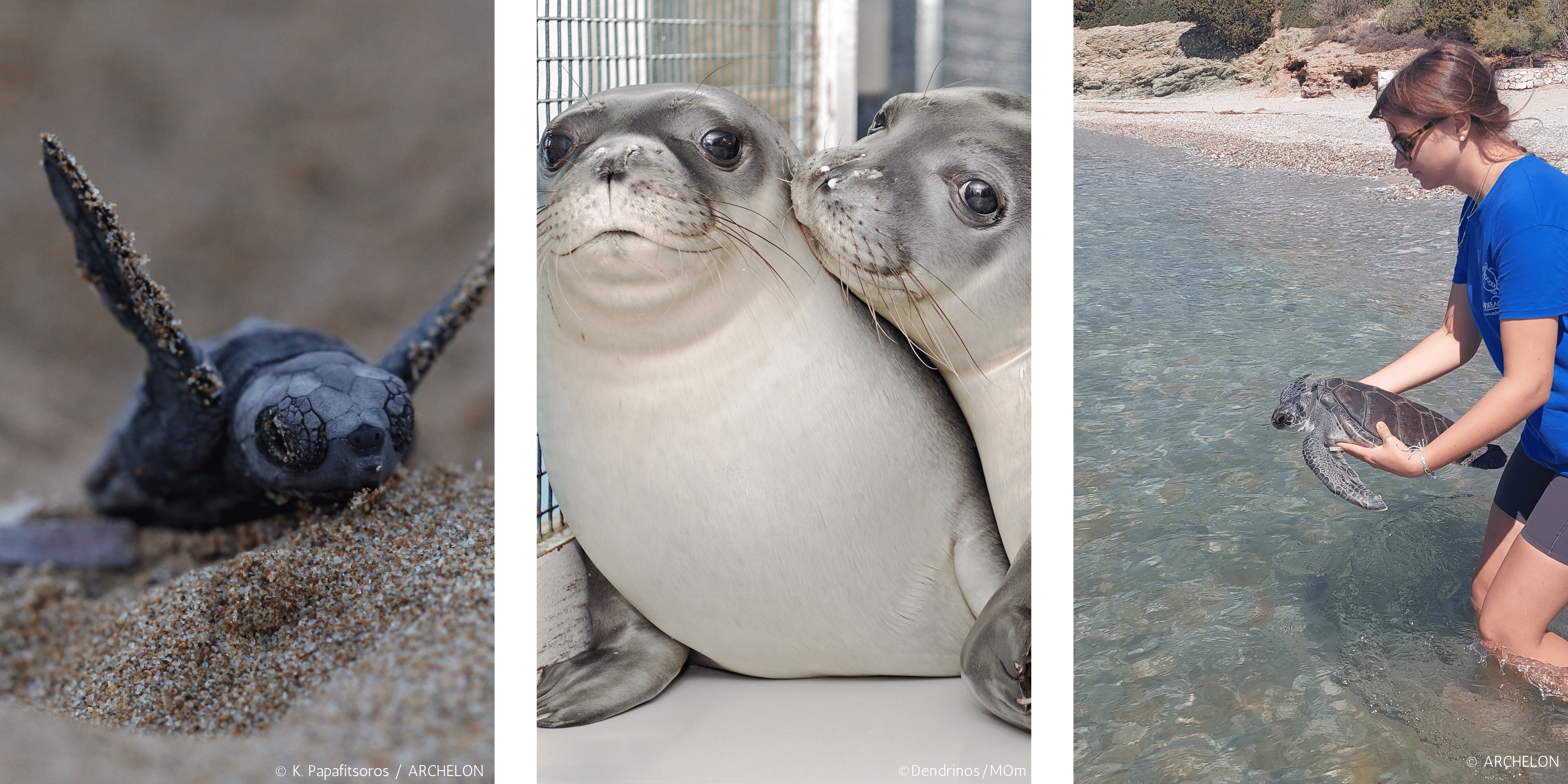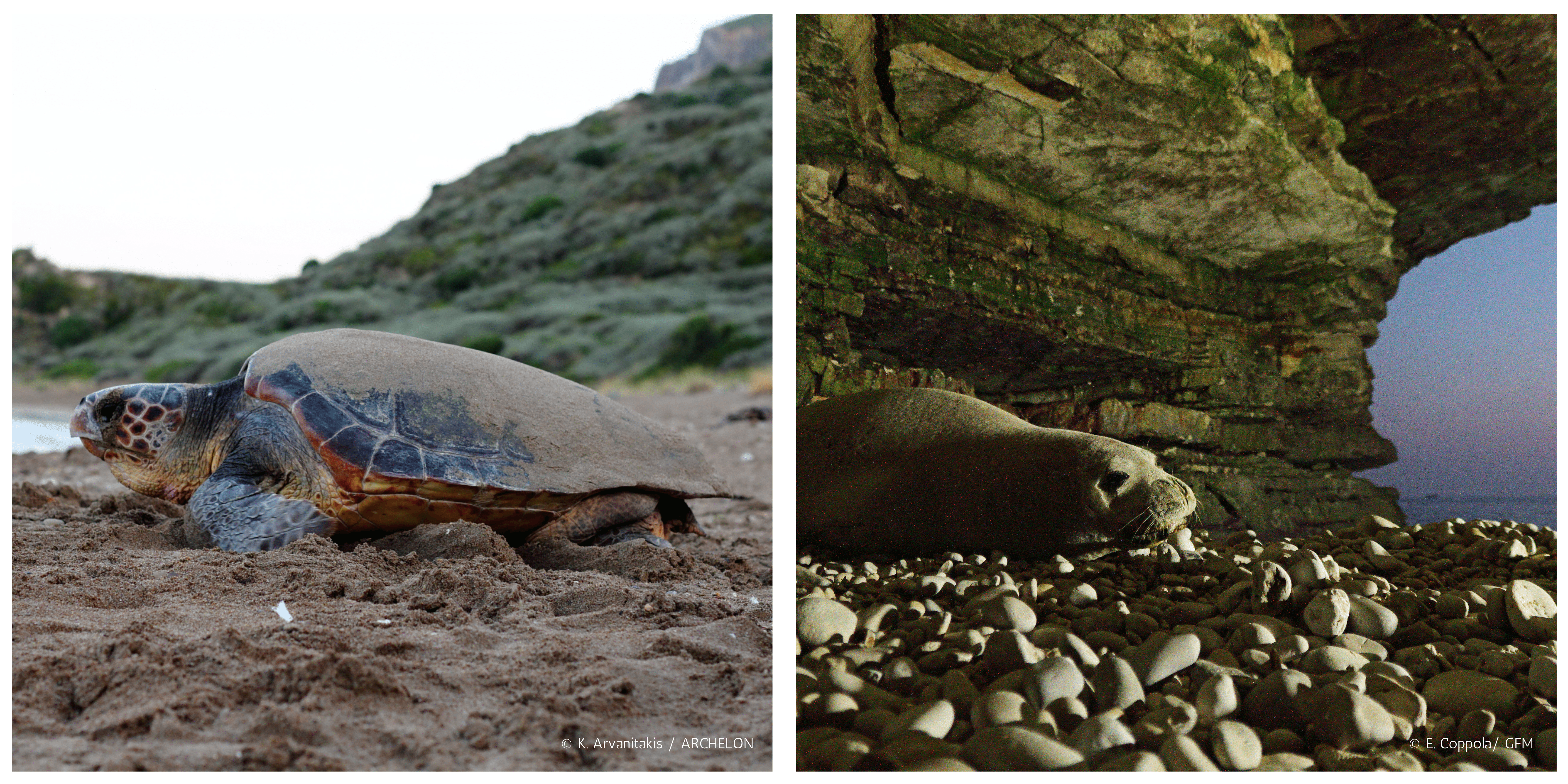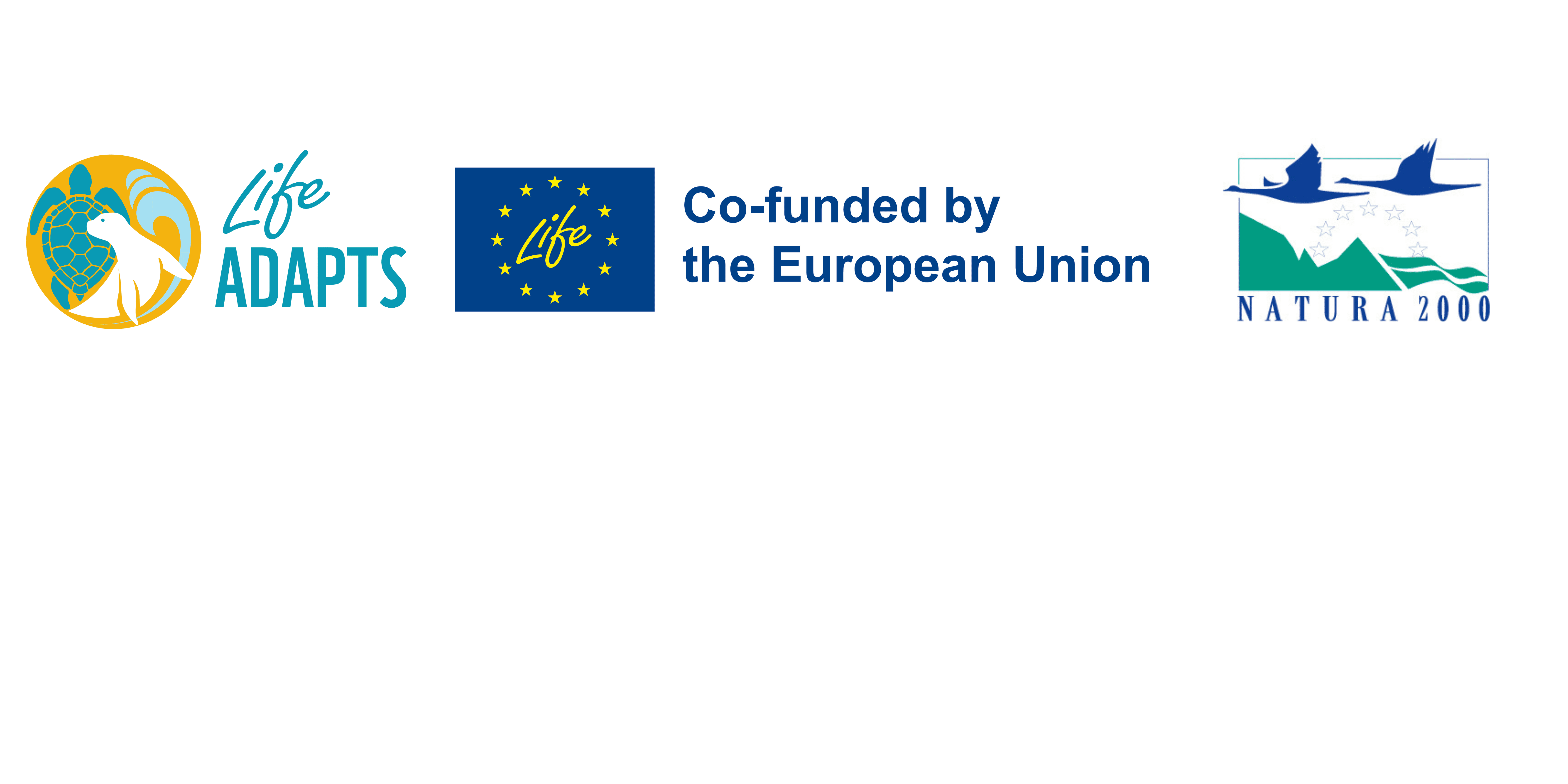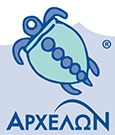New Adaptation Strategies for Sea Turtles and Mediterranean Monk Seals
Institutions, associations and researchers will work for 5 years alongside coastal communities to evaluate and respond to the effects of rising sea levels and ocean warming
Finding possible adaptation solutions for animal species that live in the sea and along our Mediterranean coasts, habitats which are increasingly affected by the climate crisis. This is the objective of the LIFE ADAPTS (climate change ADAptations to Protect Turtles and monk Seals) project, which has just been launched and is financed by the European Union. The project will last 5 years and will be carried out in three Mediterranean countries, Italy, Greece and Cyprus, where key reproductive and living areas have been identified for three symbolic species of the Mare Nostrum: green turtle (Chelonia mydas), loggerhead turtle (Caretta caretta) and Mediterranean monk seal (Monachus monachus).

The team is coordinated by the Department of Biology of the University of Pisa and includes research bodies, institutions, associations specialised in the protection of the three species, experts and researchers. Seven partners are involved: WWF and Gruppo Foca Monaca in Italy, ARCHELON (The Sea Turtle Protection Society of Greece) and MOm (Hellenic Society for the Study and Protection of the Monk Seal) in Greece and MEDTRACS (Mediterranean Turtle Research and Conservation Society), the Oceanography Center of the University of Cyprus (OC-UCY) and the Department for Fisheries and Marine Research of the Ministry of Agriculture, Rural Development and the Environment (DFMR) in Cyprus.
By 2030, thanks to the LIFE ADAPTS project, it will be possible to evaluate the three species’ resistance and resilience to the effects of climate change, such as sea level rise and temperature increase. These are, in fact, among the factors that can influence the suitability of breeding sites, the reproductive dynamics and food resources availability of these animals. The aim of the project is to develop strategies capable of protecting their crucial habitats, both in the open sea and along the coasts and stimulate the species' resilience capabilities. Innovative techniques, already partially successfully tested, will be used such as environmental DNA (collection of water or other kinds of samples to identify the presence of target species), surveys with drones, satellite telemetry, camera traps, diving, direct beach monitoring and sand temperature measurements. In addition to experts and researchers, volunteers, divers, and boat owners will be involved in an array of citizen science activities. One of the key points of the project is the involvement of local communities and authorities, as fundamental subjects for achieving the project’s objectives.
Monk seals and loggerhead turtles have been long established as flag species for marine nature conservation in Greece due to the consistent efforts of MOm (Hellenic Society for the Study and Protection of the Monk Seal) and ARCHELON (The Sea Turtle Protection Society of Greece). The most vital breeding habitats of both species were eventually designated as the first marine protected areas in Greece and the threat of extinction in the Mediterranean was averted. However, the previous success is put to the test again by such factors as sea level rise and temperature increase which is likely to impact their populations in the coming years.

The planned actions by 2030 are: identification and mapping of breeding sites and assessment of their suitability in light of future climate change scenarios, identification of important marine areas, implementation of conservation measures, dissemination of informative material to the general public, authorities or municipalities, such as intervention and behavioural protocols to be followed in the event of sightings or finding of individuals in difficulty, rescue interventions on injured animals and their recovery for release into the wild, reduction of anthropogenic impacts at key sites such as caves, nesting beaches and feeding areas, improvement of conservation measures for the three species in Marine Protected Areas and other key sites.
CLIMATE EFFECT ON SEA TURTLES AND MONK SEALS
Sandy coasts used by marine turtles as nesting ground and caves chosen by monk seals for breeding face risks linked to the effects of the ongoing climate crisis: these two types of sites are influenced, for example, by sea level rise which could cause their disappearance or reduce their potential. Furthermore, the increase in sand temperatures can cause a "feminisation" effect for sea turtles (increase in the percentage of female individuals in hatches).
Rising sea levels due to global warming could lead to the flooding of monk seal pupping caves, resulting in the loss of these critical habitats for a successful reproduction of these animals. This could lead to reduction of pups produced, with consequent reduction of genetic diversity and potentially resulting in population decline. At sea, climate change also affects food availability and can cause changes in the distribution of feeding areas and the availability of resources, such as, for example, with the increase in alien species. Having a clear picture of the potential changes in advance and implementing the adaptive measures developed during the project will allow us to protect these iconic Mediterranean species more effectively in the future.
For more information: wwf.it/lifeadapts

World Sea Turtle Day: We can all live together!
World Oceans Day: Conservation and Anthropogenic “Wounds” in Laganas Bay, Zakynthos
RECENT NEWS
- OUR NEWS23/01/2026
A turtle we treated 10 years ago was found in Spain!
“Castello” is a male Loggerhead turtle that was treated at our Rescue Centre in 2015. In 2025 he was found again at a Rescue Centre in Spain!
- OUR NEWS02/01/2026
Against All Odds: A Story of Marine Resilience from Amvrakikos Gulf
One turtle has been surviving for at least six years without a lower jaw!
- OUR NEWS29/12/2025
“Meetings with Remarkable Animals” A Heartwarming Reward for Our Efforts
Kristi Stassinopoulou shared with us a very personal moment: a sketch and a few pages from her book “Meetings with Remarkable Animals"
- OUR NEWS17/12/2025
ARCHELON’s Research: Expanding the Map of Mediterranean Green Turtles
In recent years, some green turtle nests have been recorded in Greece, indicating that the geographical spread of this species’ nesting areas in the Mediterranean is beginning to expand.
- OUR NEWS12/12/2025
The Power Behind Sea Turtle Conservation: Our 2025 Field Leaders
With deep gratitude, we honor all the Field Leaders who contributed to the success of the 2025 Field Projects.
- OUR NEWS10/12/2025
Unprecedented appearance of Leatherback Turtle on a Mediterranean beach
A new scientific record brings to light an extremely rare event for the marine life of the Mediterranean: the first confirmed appearance of an adult Leatherback Turtle (Dermochelys coriacea) attempting to nest in the Mediterranean basin.
- OUR NEWS08/12/2025
Applications Now Open for 2026 ARCHELON Field Leaders Posts!
ARCHELON is pleased to announce that applications are now open for the 2026 Field Leader positions across all nesting projects (applications open until January 31st).
- OUR NEWS05/12/2025
Saving Sea Turtles Together – A Tribute to Volunteers
On Volunteer Day, we take a moment to celebrate all those who came from near and far, put on the blue T-shirt, and embraced this important responsibility.
- OUR NEWS01/12/2025
Laganas Bay, Zakynthos: Successful Loggerhead Reproduction, Ongoing Habitat Problems
On the beaches of the Zakynthos National Marine Park, around 2,155 turtle nests successfully hatched thanks to active protection measures, but human pressures on coastal and marine habitats continue.
- OUR NEWS26/11/2025
A Second Chance: Two Loggerhead Sea Turtles Return to the Sea Thanks to Dedicated Rescues
This summer, two adult loggerhead sea turtles, ‘Aktaia’ and ‘Herbert’, arrived at ARCHELON’s Sea Turtle Rescue Centre needing urgent help after sustaining severe head injuries.
- OUR NEWS11/11/2025
Volunteering Projects 2026: Sea Turtles Need You, the Planet Needs Us!
ARCHELON welcomes volunteers from all over the world and of all ages (over 18) and no prior experience is required! If you speak English, are at least 18 years old, and are in good physical condition, you can do this!
- OUR NEWS10/11/2025
Outstanding Recognition for ARCHELON at the Effective Dialogue Conference 2025
On Thursday, November 6, 2025, ARCHELON received an honorary distinction for its substantial contribution to effective dialogue on sustainability, social responsibility, and the environment
- OUR NEWS06/11/2025
6th Year of Online Tours: The sea turtles are traveling across Greece once again!
Students from every corner of the country, as well as from international schools, have the opportunity to learn up close about the lives of the turtles cared for at the Sea Turtle Rescue Centre in Glyfada, Attica, and to discover how rescue efforts impact the marine world.
- OUR NEWS31/10/2025
The lecture turned into reality: A real turtle rescue for the students from Kallithea!
The students spotted a sea turtle floating in the water right after their educational tour of the ARCHELON Rescue Centre and immediately notified the rescuers.
- OUR NEWS24/10/2025
LIFE MareNatura Documentary Premier
From seabird monitoring and genetic sampling, to unique underwater footage of marine mammals, the testimonies of scientists bring to life the hidden stories of the sea.

